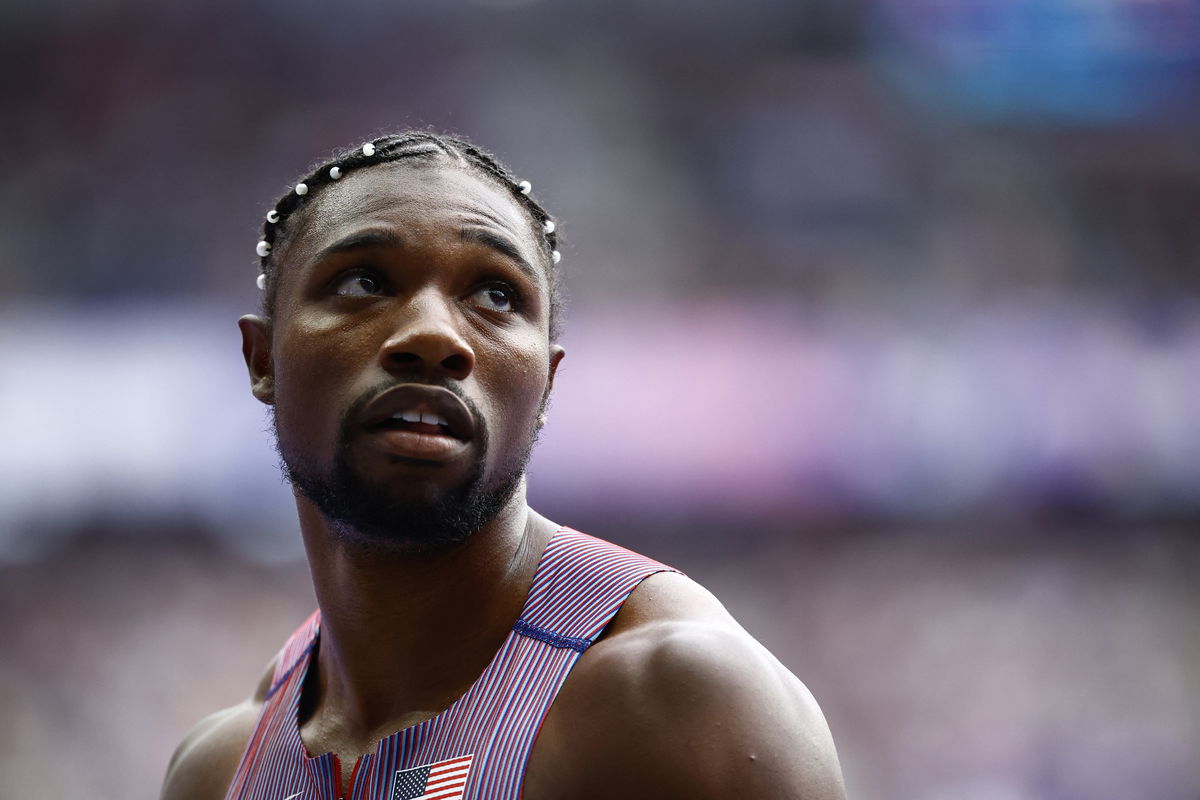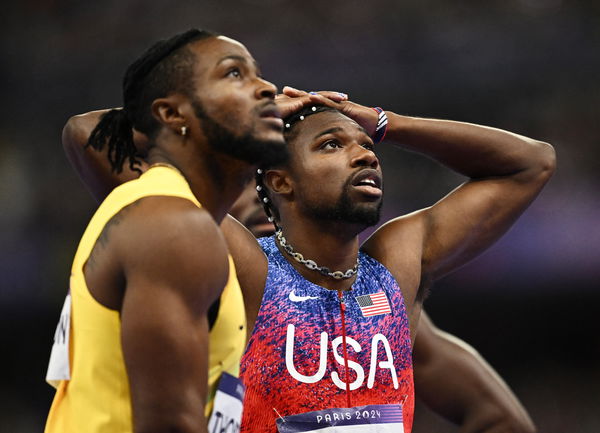
Reuters
Paris 2024 Olympics – Athletics – Men’s 100m Round 1 – Stade de France, Saint-Denis, France – August 03, 2024. Noah Lyles of United States reacts after heat 3. REUTERS/Sarah Meyssonnier

Reuters
Paris 2024 Olympics – Athletics – Men’s 100m Round 1 – Stade de France, Saint-Denis, France – August 03, 2024. Noah Lyles of United States reacts after heat 3. REUTERS/Sarah Meyssonnier
Noah Lyles may be the fastest man. But even he isn’t immune to the unfortunate realities of track and field. He has multiple times, over the course of this year, spoken about the financial situation that track and field athletes face. During the NYC Grand Prix 2024, the event went on to put it cut and dry by saying, “I know it is very hard for us to be able to save for retirement when we don’t have a 401K.” Oops! While crossing that finish line to win gold is a tangible dream, the gold at the end of it all is still an elusive dream.
Watch What’s Trending Now!
However, this is not a new issue. In fact, it is an age-old problem that still exists. Another track and field legend also went on to talk about the same recently. On an episode of his podcast Ready Set Go, Justin Gatlin went on to make some revelations. Now, Gatlin is someone who has run alongside Usain Bolt and holds five Olympic medals in short-distance sprints. While Noah is at the inception of his glory, Gatlin’s glory days have passed. And he had something to say about the stagnant state of track.
ADVERTISEMENT
The unchanging financial landscape of track and field
Justin Gatlin went into the nuances of athlete payments and finances. Talking about the possibility of change, Gatlin was rather pessimistic. He went on to say, “I mean, our sport, at this point in time, we’ll never get to that point, right? Until you cut the heads.” Gatlin is frustrated, and rightly so! He has seen it all, from greed and mismanagement to tactics used to shut athletes up.

Reuters
Paris 2024 Olympics – Athletics – Men’s 200m Final – Stade de France, Saint-Denis, France – August 08, 2024. Letsile Tebogo of Botswana crosses the line to win gold ahead of second place Kenneth Bednarek of United States and third place Noah Lyles of United States. REUTERS/Marko Djurica
As Gatlin himself puts it, “Until a lot of things change—heads are taken, places are being replaced. A lot of people are greedy in this sport. The trickle effect is crazy in our sport, right? Like the money flowing from the top stops and maybe trickles out.” Gatlin’s words are the unfortunate reality of track and field. When the athlete is in peak form, there is some amount of money that flows. But after that, it is almost like walking into oblivion.
ADVERTISEMENT
For all the glamour of Olympic gold and fastest sprints, the financial reward is often more of a façade than a fortune. So why doesn’t the track community speak more? Well, athletes do speak up, but unfortunately, the strategy to silence them is stronger. As Gatlin himself puts it, “When you see a lot of people in uproar, then all of a sudden, okay, we got a little more money, here you go. Oh, what about this? Okay, we got a little more money, here you go.” Gatline seems to have touched the right point here.
Top Stories
Sources: John Harbaugh Wasn’t Fired, Left Ravens After Refusing Major Staff Changes

Bill Cowher’s Strong Message to Steelers on Firing Mike Tomlin After HC’s Blunt Playoff Message

Bengals’ Cam Taylor-Britt Sentenced to Jail: Everything We Know About Charges Against Him

Kyle Tucker Handed Blunt Reality Check as Blue Jays Shift Focus to Bolster Vladimir Guerrero Jr.

US Visa Rejections Put Major Track & Field Records at Risk at World Cross-Country Championships

Chiefs’ $58M News Complicates Travis Kelce’s Return As TE Gets 8-Figure Update

Let’s take the 2024 Paris Olympics, for example. When the talks around finances became one with traction, the World Athletics introduced a $50,000 prize for gold medalists to bridge the financial gap. The move, of course, while appreciated, barely made a dent in the larger tapestry of problems. Another similar instance of Gatlin saying, “A little more money, here you go,” is the Diamond League. After Grant Holloway pulled out of the races and athletes raised concern, DL increased their price! It sure does sound like a game of catch-up and not a solution. This becomes even more evident when one looks at Noah’s finances.
ADVERTISEMENT
Noah Lyles’ earnings are low despite being the fastest man
Noah Lyles, hands down, had one of the best athletic years. He started the year at New York, clocking 19.77 in 200m. And then he went on to Diamond League meets and, last but not least, the Paris Olympics. Now, Lyles has won most of these races, which means his earnings should be high, right? But his finances tell a different story. At the end of 2024, his total earnings from races stands at a mere $127,800. The numbers from each race tell the complete story.

Reuters
Paris 2024 Olympics – Athletics – Men’s 100m Final – Stade de France, Saint-Denis, France – August 04, 2024. Noah Lyles of United States and Kishane Thompson of Jamaica await the result before Lyles is announced as the winner of the gold REUTERS/Dylan Martinez
Noah was a part of the New Balance Indoor Grand Prix, which paid him only $4,000. Meanwhile, at Paris, where he ran the fastest 100m race in history, Noah earned only $50,000. Meanwhile, the trials got him $11,000 each. To add on, his wins at Diamond League meets, such as Monaco, added $10,000 each to his earnings, while smaller competitions offered payouts as low as $1,000. Now, the total may seem like a big number, almost reaching $130,000. But here’s the catch: these are not just personal earnings!
ADVERTISEMENT
Unlike a lot of mainstream sports, the income figures that the athletes make go into covering costs. This includes training, travel, coaching, and medical expenses that come with being a world-class athlete. Now, for Noah Lyles, the earnings fall short, of course, but what invigorates him more is the gap between track and other sports. Sports where athletes often make millions in a single season. It is clear that both Lyles and Gatlin are talking about a greater systemic issue that plays here, which is unfortunately still not addressed well.
ADVERTISEMENT
ADVERTISEMENT
ADVERTISEMENT

